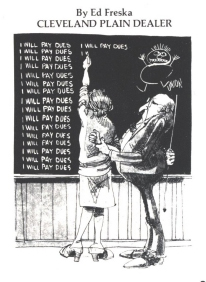If You Can't Beat Them; Buy Them
Big Labor lost at the ballot box and had their forced unionism power rolled back by the legislature and is now trying to buy Wisconsin Supreme Court Justices to undo the reforms pushed enacted by Gov. Scott Walker. The Wall Street Journal reports: Wisconsin Democrats and unions are still seething over their failure to thwart Governor Scott Walker's government union reforms. Now they're trying to spin their rage into gold by aiming it at the state Supreme Court election on April 5. If they defeat David Prosser's re-election bid, labor leaders and their Democratic allies hope a newly activist court will be their proxy in the fight against Mr. Walker's policies. Until the recent political inferno in Madison took over national headlines, the Supreme Court race was a snoozefest. Justice Prosser, who has served on the court for more than a decade, was the heavy favorite to hold onto his seat. In February's jungle primary that includes all candidates (all of whom are officially nonpartisan), he won 58% of the vote, followed by 25% for second place Joanne Kloppenburg, the assistant attorney general and an environmental attorney who is now the union darling. The top two primary finishers compete in the run-off, and that race is narrowing. A liberal outfit called the Greater Wisconsin Committee has thrown some $3 million into the race and launched a website, ProsserEqualsWalker.com, to whip heat against the Governor into the race. Democrats hope a victory would discourage other Republicans who might dare to face down Big Labor. The Wisconsin Supreme Court is divided 4-3 on many cases and tilts slightly right. A defeat for Justice Prosser would shift that balance, and a notoriously liberal contingent led by Chief Justice Shirley Abrahamson would dominate when the court hears the Democratic challenges to Mr. Walker's reforms, which limited collective bargaining and required government unions to be recertified every year by their members. That battle was recently joined when Dane County Circuit Judge Maryann Sumi put a hold on the law, and a state appeals court ruled yesterday that the Supreme Court should decide the case. If they flip the court, Democrats are also sure to target major tort reforms that Governor Walker signed earlier this year. Watch for trial lawyers dancing in the streets. From 2004 to 2008, the court's liberal majority, including Obama nominee to the federal bench Louis Butler, overturned medical malpractice caps and established a collective guilt standard whereby any company that had ever sold lead paint in Wisconsin could be subject to tort claims.





